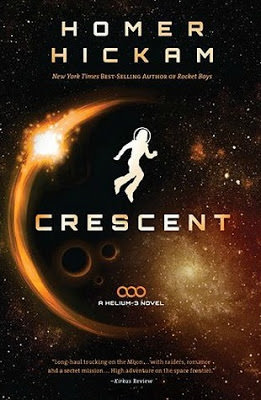You probably know Homer Hickam from his book “Rocket Boys” and the movie, “October Sky.” But Hickam’s repertoire of 15-plus books range from fiction to nonfiction, covering multiple topics beyond space flight and building rockets.
His most recent series – the Helium-3 trilogy of life on the Moon set 120 years into the future — is science fiction written for young adults. But adults with a penchant for science fiction seem just as taken with these books and their engaging characters.
Find out how to win a copy of “Crescent”
“I like to say I’m like Robert Heinlein, in that I write all my books for everybody!” Hickam told Universe Today by phone in a recent interview.
The idea of writing for a younger audience, he admits, wasn’t his own.
“I was asked to write a series for young adults,” he said, “and I had never had really written for that age group before. I figured it would be a challenge to write something that would be of interest to them, but I kind of took the easy way out by projecting the story 120 years into the future where I could make young adults think, feel and do pretty much what I wanted them to do! Hopefully I created characters that young adults will enjoy.”
Hickam has succeeded. The first book in the Helium-3 trilogy, “Crater” was published in 2012, and the newest, called “Crescent” was published this summer. Both books have been well received by young adult readers, and as mentioned, by adults, too.
The protagonists in the series are young adults themselves, which means there’s a lot of room for growth, discovery and coming of age.
Crater Trueblood is a 19-year-old miner of helium-3 on the Moon who has been forced to become a soldier in the ongoing war against the Crowhoppers. Crowhoppers are bio-engineered humans that are trained for battle and trained to kill. During a battle, Crater captures one of the Crowhoppers, a female named Crescent. Instead of killing her, as she expects and wants, Crater brings her to Moontown and finds he enjoys being with her.
Bring in Maria Medaris, the granddaughter of the richest man on the Moon, Colonel Medaris (a descendant of the character Jack Medaris from Hickam’s 1999 book, “Back to the Moon.” Maria and Crater have a history together, with a complicated relationship. But they end up defending Crescent when she’s falsely accused of murder; then Crater and Crescent escape into the lunar wilderness to avoid Crescent’s imprisonment and to survive must defend themselves from both the Moontowners and a band of Crowhoppers sent to capture or kill them. They must make hard decisions of what is worth fighting for.
Hickam says all his fiction books are character-driven, but he takes every chance he can to include scientifically accurate information.
“It’s very important to me to have scientifically accurate details,” Hickam said. “But where I put in technical details, it is primarily to advance the plot or for the character to grow – in other words, I’m not writing a textbook.”
But of course, there’s also speculation within the story, such as the gillie, a computer that is a synthetic, semi-sentient life-form.
“Nobody has created that yet,” Hickam said, “but it’s nothing I’ve invented out of whole cloth, as some scientists are looking to create a bio-computer.”
But that leads to contemplation of what do you do with a lifeform that is a computer.
Additionally, Hickam’s depiction of life on the Moon in the next century certainly isn’t of a utopia.
“I think that 100 years in the future we’ll probably be surprised about what is life is going to be like then,” Hickam said. “What I’ve done is take technology of today and imagine what it is going to be like 120 years in the future, with some bumps in the road. I don’t see any kind of nirvana or utopia coming –and we’d probably be all pretty bored if that happened! I think advances will come in biology and technology fields, and that is going to raise a host of moral questions for all of us.”
For example, Crescent is a genetically engineered human that is made to look ugly and fearsome as well as being a trained killer.
“So what do we do with humans that look scary, or that act even scarier?” Hickam pondered. “For those who haven’t read the book, think about what if you had someone who loved nothing more to help you, take care of you, cook for you, do everything for you. Everyone says, oh yes, that’s great. But you do know you are talking about wanting a slave. We are going to be able to create helpers, and when we do that, the moral questions for the human race is going to be huge.”
Of all the characters in this series, Hickam says he’s most intrigued by Maria.
“To me Maria is a fascinating character, and we’re still not sure about her and how she’s going to end up,” he said.
And how is the series going to play out? Hickam turned in his transcript for the third book in the trilogy in early September, but gave us no hints of what’s to come.
“The third one is supposed to wrap it all up,” he said with a laugh, “but really, there’s no way to wrap it all up!”
Tomorrow, we’ll talk more with Hickam about his journey from rocket scientist to writer and his views of the current state of space exploration.

